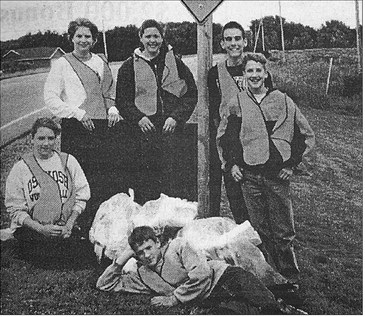County OK’s $4.5M project list


With over $4.5 million in capital projects on Marathon County’s to-do list for next year — and zero dollars in rollover money from the year before — county administrator Lance Leonhard has told the county board to expect “the least bad plan I can bring you” for funding the most necessary projects.
“You don’t have a lot of options,” Leonhard told supervisors at the board’s Aug. 21 educational meeting board meeting.
At its Aug. 26 meeting, the board voted unanimously to approve a preliminary list of capital improvement projects for 2026, which includes about $1.8 million in bridge and culvert replacements, $736,000 for technology upgrades and $2 million in scheduled vehicle replacements.
Even though the list has been approved, funding for each of the projects still needs to be allocated through the 2026 budget process, which will stretch into November when a budget is adopted. Chris Holman, deputy administrator of public works and capital projects, said he has received capital improvement project (CIP) requests from all county departments, but with limited funds available, he narrowed the list down to only the highest-priority items and “put everything else by the wayside.” Local highway projects include the resurfacing of CTH E, from STH 153 to CTH P, in the town of Eau Pleine and replacement of the CTH U bridge over the Little Rib River in the town Stettin.
Highway projects are at the top of the list because the county needs to continue spending its own money on road projects if it expects to keep getting a steady amount of General Transportation Aid (GTA) from the state. GTA amounts are based on a six-year average of the county’s annual road expenditures, so the county would lose money over time if it reduced its spending on highway projects.
County administrator Lance Leonhard emphasized the importance of GTA funding as a way to get the state to pay for 80 percent of project costs. Event if the county’s highway spending remains steady and other counties continue to spend more, Marathon County will get a smaller share of available money, he noted.
Other high-priority projects fall into two categories: information technology upgrades needed for county employees to do their jobs and sched- uled replacement of vehicles that are part of a contract with Enterprise Transport to maintain an updated fleet of cars, trucks and other vehicles.
All other CIP categories, including parks projects, sheriff’s office improvements and maintenance at the UWSP-Wausau campus, have been zeroed out for next year.
“We stripped out everything that wasn’t mission critical,” Leonhard told members of the Human Resources, Finance and Capital Committee.
Leonhard said the lack of rollover funds available for next year’s capital projects is primarily due to a decision made by the board last year to use reserve funds for an $8 million loan to Bug Tussle for completing a countywide broadband expansion. The board had the option of issuing conduit bonds to pay for the $8 million loan, which would not have directly affected the county’s finances, but it opted to use reserve funds instead, which led to the loss of $6.8 million in rollover money for 2026, Leonhard said.
“That decision is why you don’t have rollover money,” he told supervisors.
Leonhard said the county has previously
borrowed money to complete capital projects and then used property taxes and sales taxes to service the debt, but he does not plan to propose more borrowing at this point. As a result, he said 2026 will be a “tight year” with a lot of deferred maintenance.
“I will bring you a plan that funds the things that are critical,” he said.
Looking ahead, Leonhard said the board will likely face another shortage in rollover money next year when planning for 2027’s CIP projects after supervisors decided last November to take another $1.6 million out of reserves to lower the property lax levy. However, he does not anticipate that rollover amount to be zero again.
Supervisor John Robinson, chair of the HRFC, said the CIP plan for next year is still “a work in progress,” but he reminded supervisors that deferring maintenance in the past has resulted in unexpected projects, such as fixing the library roof in Wausau and making emergency repairs to the county jail.
“I would encourage all of you to look at capital budgets, not not just operational budgets,” he said.




